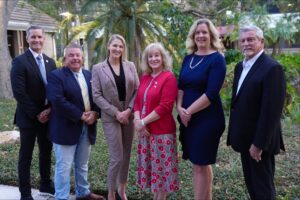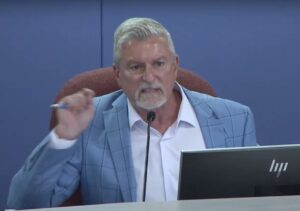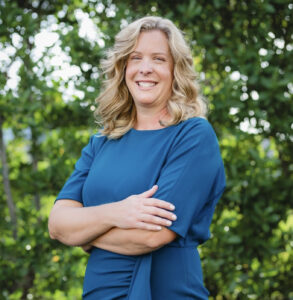Distraction or safety tool? School board members discuss results of survey.
Ramon Lopez
Original Air Date: Feb. 5, 2025
Host: Cellphone use at school is a thorny subject. The Sarasota school district waded into the controversial effort to adjust cellphone use in the classroom by polling students, parents and other stakeholders. Ramon Lopez has the poll’s results.
Ramon Lopez: The Sarasota School Board on Tuesday was briefed on the results of a student cellphone use in county schools survey conducted by School Superintendent Terry Connor.

Sarasota County School Board members. Photo via sarasotacountyschools.net.
The survey provided useful data on the controversy regarding student access to their phones on school grounds. Sarasota schools comply with state statutes regarding the matter, but some school board members believe a more restrictive policy may be needed.
Board member Tom Edwards, for example, says data is out there that cellphone usage and social media is damaging to students’ mental health and a distraction to students.
But fellow board member Liz Barker and other parents with children in school take comfort in being able to reach their offspring there as school shootings remain a serious problem in the United States.
Florida state law says students may not use a cellphone during class time except with a teacher’s permission. The Sunshine State has joined seven other US states in restricting cellphones in schools. Proposed legislation or recommendations are being considered in 17 other states.

In the classroom, cellphones can be a tool—or a distraction.
Arkansas and Delaware have earmarked funds for acquiring lockable pouches for students to store cellphones during the school day. Statewide, 20 school districts have “bell-to-bell” bans on student cellphones, but 47 allow their use outside the classroom. No US state currently requires those lockable cellphone pouches.
The cellphone ban policy varies in Sarasota County. Elementary school pupils cannot use cellphones at any time. Middle school students must have their phones silenced and put away unless needed for classroom instruction. The same goes for high schoolers. But they can use their phones between classes and during lunch period.
Connor said the survey was conducted over a two-week period and was far-reaching. It asked whether the cellphone policy needs to be revised and what the penalties should be for violations.
Terry Connor: Over 8,000 responses came in. The majority obviously came from students. They had a lot to say about that. We had a great participation rate from parents of almost 3,000; over 100 administrators; over 1,00 instructional staff; over 200 support staff; 60 district

Terry Connor. Photo via sarasotacountyschools.net.
staff; and 26 community members. We have a lot of students and staff that bring a cellphone to school. Over 90 percent was our total in terms of bringing a cellphone to school, and the question then asked, “Do you think the district policy is about right, too strict, or too loose?”
Obviously, you can see students think it’s too strict. 70 percent. But if you look over all—I want to see the trend there—I would say over the majority believe it’s about right, according to the survey.
RL: Connor outlines the survey’s results.
TC: In summary, at elementary level, the majority of respondents—54%—parents 60 and staff 72—prefer the current cellphone restrictions, and the majority did feel that option one, which is the more lenient option over our current consequences, was the preferred selection. At the middle school level, the majority prefer the current restrictions and preferred option one as well, which was a little more lenient, and then at the high school level, keeping the current cellphone restriction was the majority of the respondents as well as option one which is, again, more lenient than our current student code of conduct on the consequences.
RL: Sarasota School Board members said they now have a lot more to work with as they consider revising the current student cellphone policy. School Board Chairman Tim Enos:
Tim Enos: My personal opinion is I think it’s right. The staff is using it appropriately. I’m not for more leniency. I think that that part has to stay the same.
RL: Member Tom Edwards:

Tom Edwards.
Tom Edwards: The policy that we have right now is not enforced consistently. Everything ends up back on the teacher at a time when teachers don’t have a lot of time and the burden is still back there on the existing policy.
RL: We hear from Bridget Ziegler:
Bridget Ziegler: I would like to see it go bell-to-bell. I am encouraged to hear the fellow board members like to see a stricter stance, at least when it comes to violations.
RL: New Member Liz Barker:

Liz Barker.
Liz Barker: Another nuance that I think we have to address right now, beyond the school safety in terms of guns and mass shootings, is that we are in a challenging time for our parents. Parents are feeling unsettled. There are a lot of changes coming through. We’re having conversations about immigration changes in schools, and anything that would make it more difficult for families to reach each other in the event of a separation or an emergency makes me a little bit uncomfortable. The timing is maybe—not right now, when we have so many other changes coming down the pike.
RL: This is Ramon Lopez for WSLR News.
WSLR News aims to keep the local community informed with our 1/2 hour local news show, quarterly newspaper and social media feeds. The local news broadcast airs on Wednesdays and Fridays at 6pm.